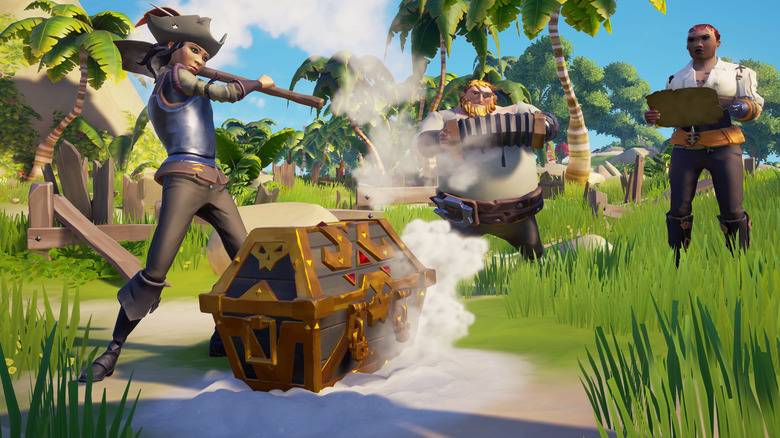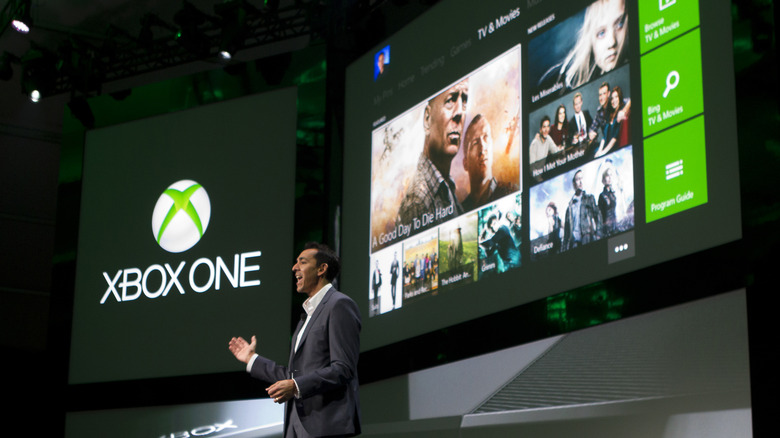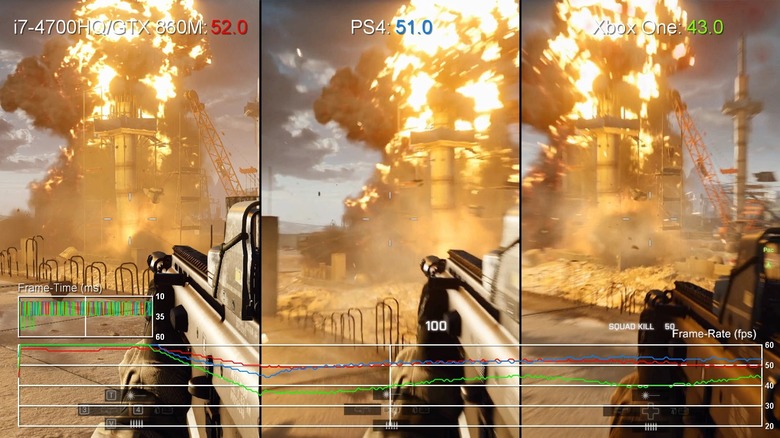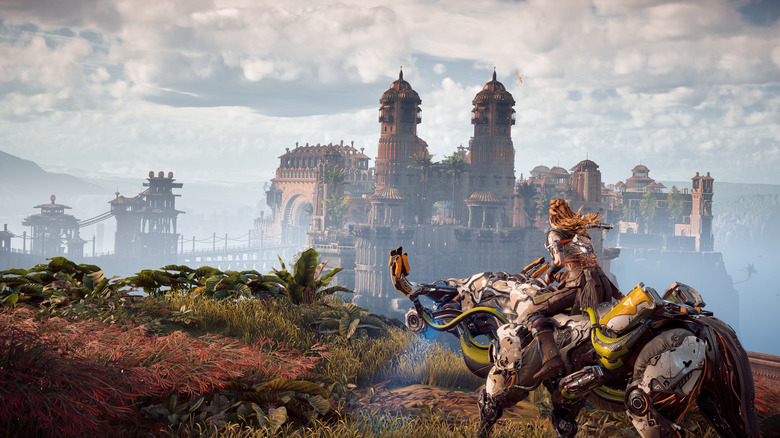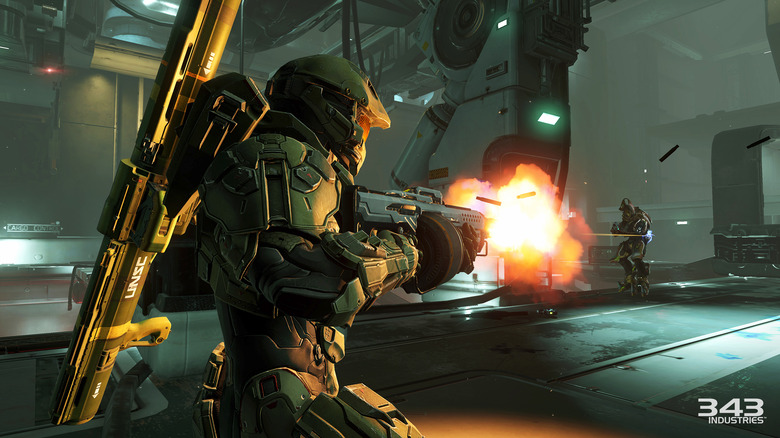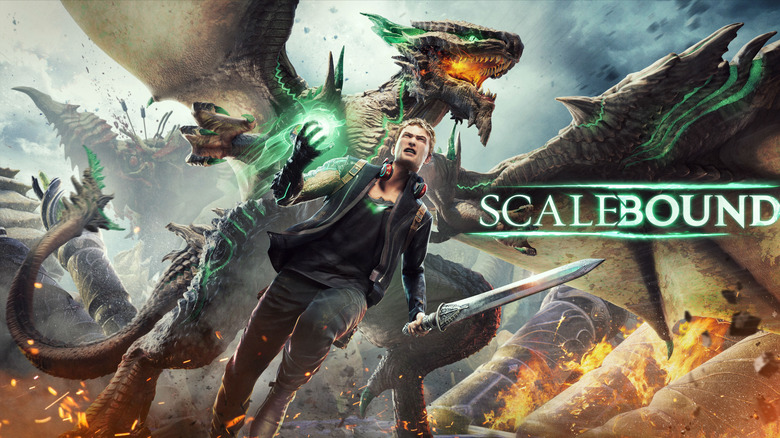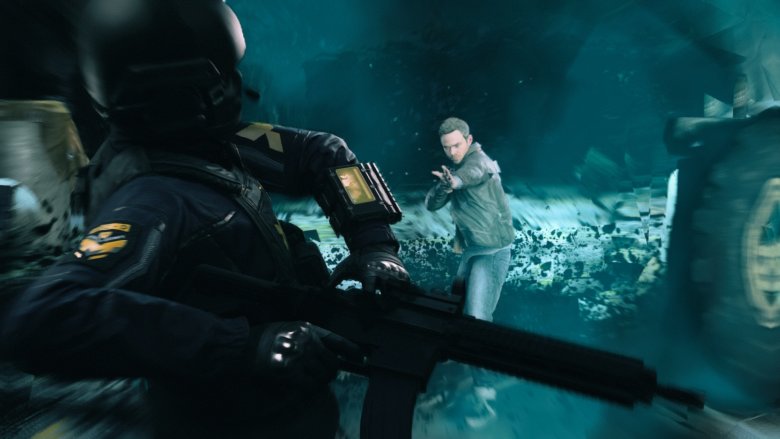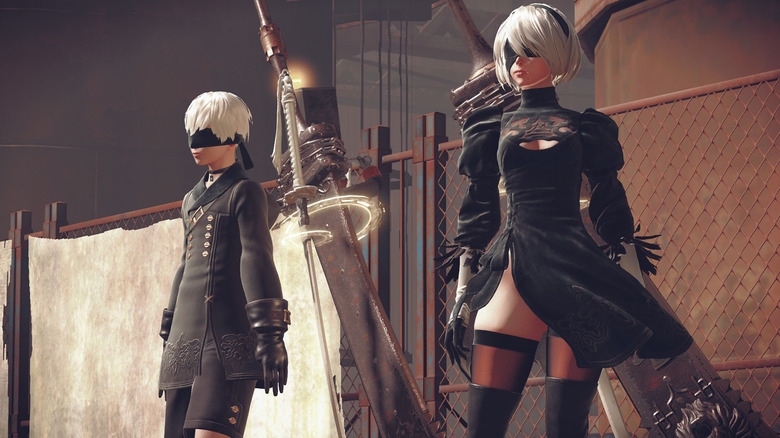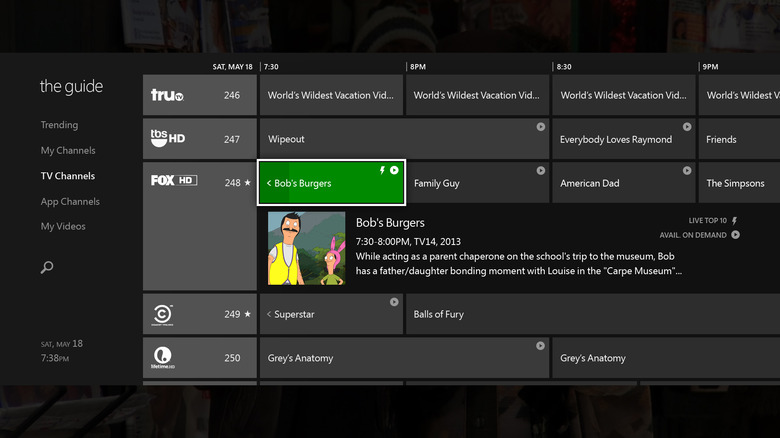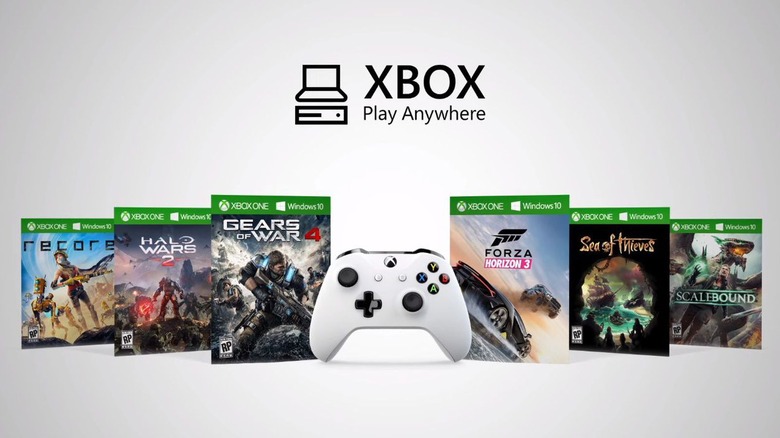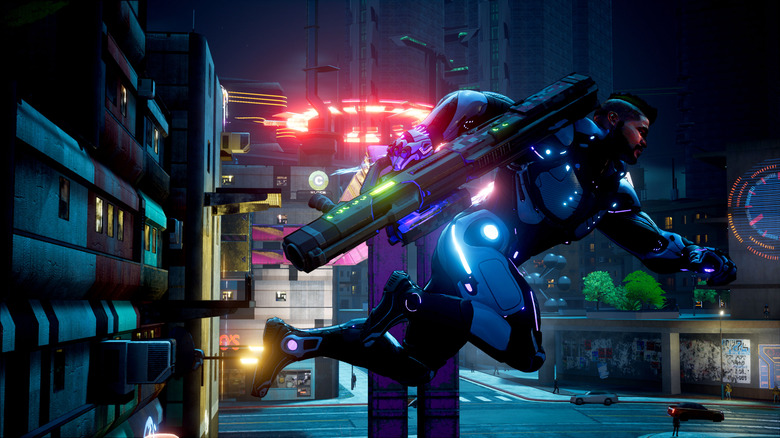The Real Reasons The Xbox One Is Failing
If you follow the video game industry, or if you're a fan of the Xbox platform, here's a fact you're probably well aware of: the Xbox One is getting its veritable lunch eaten by the PlayStation 4.
Sony's console is outselling Microsoft's heavily — so much so that Microsoft doesn't even reveal Xbox One sales numbers anymore, preferring to use active Xbox Live users as its metric of choice. And despite the fact that Microsoft is doing very interesting things with Xbox One, like Xbox Game Pass and Play Anywhere, it seems Sony's lead is too insurmountable at this point to be overcome.
It begs the question: how did the Xbox One reach this point? How did Microsoft, following the success of the Xbox 360 just a generation before, manage to mishandle the Xbox One and squander its position in the market? We've looked hard at both the past and present to solve the puzzle, and we believe we've cracked the code.
Here they are: the real reasons Microsoft's Xbox One is failing.
The disastrous reveal event
The Xbox One's present day situation can be traced all the way back to May 2013, when Microsoft first pulled back the curtain on its next-generation console. The Xbox One followed the incredibly popular Xbox 360, which at that point, was on its eighth year. Gamers were thirsty for a new system. Microsoft had wrung every ounce of power it could out of the Xbox 360. It was time for a new console.
Unfortunately, Microsoft bungled the reveal event. The company devoted most of its stage time not to the games the Xbox One could play, but instead to its potential as an entertainment device. There was a lot of focus on TV, movies, and Skype, but outside of a brief look at Call of Duty: Ghosts, Microsoft largely put games to the side.
And it got worse. When Microsoft did talk about games, it was in the context of its new DRM system, which looked to be the death knell for used and traded discs. And once Microsoft dropped the price bomb on everyone, announcing its console-and-Kinect bundle would retail for $500, the damage had been done. The Xbox One already looked bad, and it hadn't even launched yet.
Its underpowered start
Microsoft did well in rolling back some of the more controversial features of the Xbox One after its reveal. The DRM check-in system was removed. The company spent its entire E3 event in 2013 on upcoming games. And Don Mattrick, the Xbox head who famously told gamers to buy an Xbox 360 if they didn't like what the One had to offer, was replaced by Microsoft Game Studios leader Phil Spencer. All in all, some positive changes.
But Microsoft couldn't roll back the hardware it had already put in the Xbox One, and that proved to be another strike against the system.
In terms of specs, the Xbox One and PlayStation 4 weren't all that far apart. But the PlayStation 4 decided on a slightly better GPU and faster RAM, which meant games that showed up on the PS4 almost always had a graphical advantage over their Xbox One counterparts. It helped drive the narrative that the PlayStation 4 was the console for hardcore gamers — that if you wanted the best-looking console games, the PS4 was the way to go.
The Xbox One was already smarting. Being labeled the "weaker" console didn't help.
Lack of exclusives
Critically-acclaimed, AAA titles have become the PlayStation 4's hallmark, with games like Horizon: Zero Dawn, God of War, Bloodborne, and Uncharted 4 in its stable. It seems like gamers can't get through a year without Sony releasing a major exclusive for its system, and to its credit, the company has an excellent track record of delivering what its customers want.
Xbox One gamers, unfortunately, haven't been quite so lucky.
Sure, the Xbox platform has its stalwarts. Halo 5 made its way to the Xbox One in 2015. Gears of War 4 arrived in 2016. And there's always a Forza to look forward to every year, whether its the sim experience found in Motorsport or the arcade fun found in the Horizon series.
But none of these are the narrative-driven blockbusters that gamers clamor for — the ones Sony seems to deliver on a regular basis. The Xbox One needs better exclusives, but more likely than not, it'll get more of the same before that occurs.
Franchise fatigue
We mentioned those "stalwarts" above — the Halo, Gears, and Forza games — as titles that Microsoft continues to lean on heavily. And it's not to say that there haven't been great games in either of those franchises. In fact, one could argue that Forza nails it every year. But Microsoft's over-reliance on those same properties seems to be having an adverse effect.
Some just find it hard to get excited about an eleventh or twelfth Halo game, especially when Sony lets its Killzone team run wild and they come back with Horizon: Zero Dawn.
Franchise fatigue is a very real thing — just ask Ubisoft or any of the teams behind Assassin's Creed. When gamers see the same thing over and over again, they get bored, and they're less inclined to buy in. That seems to be the case as far as Microsoft's Xbox-exclusive franchises are concerned, and until the company does something to break the cycle and freshen things up, it'll be difficult for gamers to get excited about exclusives on the platform.
Poor project management
Microsoft isn't failing with exclusive games because it hasn't tried. On the contrary: Microsoft has greenlit a couple of games that would have given the company some much-needed content. Unfortunately, these same games were mismanaged into nonexistence.
One such game was Scalebound, which kicked off development in 2013. The game had a unique premise and featured a dragon as a powerful sidekick. But things just never seemed to come together. PlatinumGames, the studio behind the title, seemed overwhelmed by the project and by Microsoft's demands. Scalebound was delayed out of 2016, and in early 2017, Microsoft shocked everyone by pulling the plug on the project entirely.
Another game sought to bring back the once-proud Fable franchise, albeit in an unfamiliar way. Fable Legends was slated to be a free-to-play RPG for both Xbox One and PC, and Microsoft had hoped to have it released by 2015. But more development woes killed that title, too, and Microsoft didn't just cancel the game: it closed two studios — Lionhead and Press Play — as a result.
Disappointing games
The exclusives that Microsoft did manage to get out the door vary in both their scope and the reception they received. The company tends to do quite well with smaller titles, like Ori and the Blind Forest and Cuphead, both of which are critical hits. But many of its larger titles have underwhelmed on the Xbox One.
Take ReCore, for instance. This title had a lot of promise behind it thanks to its association with Keiji Inafune, the creator of Mega Man. It seemed to show well at industry events. And its premise — moving an AI power core between different types of robot companions — looked like it would make for some interesting platforming. But the game released in a state that didn't feel finished, and it received middling review scores as a result.
And then there's Quantum Break, a game from the talented team at Remedy Games. The title introduced some interesting mechanics, allowing players to bend time to their will in order to take down enemies and manipulate real-world objects. But the game felt pulled out of the Xbox One's early days, when the focus was on TV and not on games. TV episodes split up gameplay segments, and because so much focus went into the TV aspect, the gameplay itself turned out bland.
Dearth of Japanese support
The Xbox 360 was never a dominant console in Japan, but to its credit, it did manage to pull in Japanese support for its US audience. The console played host to a number of Japanese-style games, including Blue Dragon, Lost Empire, Catherine, and more. If you wanted to play more than first-person shooters and sports games, the Xbox 360 library made it possible.
That's not to say the Xbox One doesn't have variety in its games. But there's a clear gap in the number of Japanese titles available for the Xbox One versus those available for the PlayStation 4. In fact, the PlayStation 4 has a number of console-exclusive titles that it doesn't even have exclusive deals for. There's nothing contractually preventing titles like Nier: Automata or Yakuza 6 from coming to the Xbox One. The respective developers of those games have simply decided not to port them over.
The lack of Japanese support on Microsoft's console has helped give the PS4 an upper hand in the games department, and there are no signs Microsoft is taking steps to fix it.
Features that don't reach their potential
Despite the cold reception at the Xbox One reveal event, there are a number of gamers who do like the console's TV features. Or they did when they existed. But over time, Microsoft has slowly stripped that functionality out of the Xbox One's operating system. The "Snap" feature, which allowed gamers to watch TV while playing a game, has since been removed. And the guide feature, which shows TV programming, is more hidden in the console's OS than it was at the start. Simply put: if you bought an Xbox One on its promise of combining both TV and video games, it's now failing to keep it.
Likewise with the company's Kinect initiative. The Kinect promised to offer hands-free operation of the console, so you could search your game library with your voice and start up software without having to pick up your controller. The device also gave you a way to chat without wearing a headset, using noise-canceling tech to remove nearby sound and allow you to play online games with your gorgeous surround sound system at full blast.
The Kinect is all but dead now. The dedicated Kinect port has been removed from both the Xbox One S and Xbox One X, and the adapter Microsoft sold to offer support for its newer consoles has been discontinued. The few features that differentiated the Xbox One from its competition have disappeared, and when you're losing, that's not a good thing.
Uncertainty surrounding the platform
Does Microsoft believe in console gaming anymore? It's an interesting question to ask, and one you might believe is fair based on decisions the company has made since the PlayStation 4 started pulling away from the Xbox One.
High-quality exclusives are an important part of a console's allure. They're one of the factors that a buyer uses when considering which system to buy. PlayStation 4 owners, for instance, might have been intrigued at the prospect of playing Uncharted 4. Nintendo Switch owners might have picked up a Switch because there's no other place to play Mario games.
Microsoft seems to be doing away with console exclusives entirely.
The company's Play Anywhere project is great if you play games on both console and PC. You can play what is essentially the exact same title on both platforms and enjoy cross-play and cross-saving features. And Microsoft now offers all of its first-party titles as Play Anywhere games, which means you can enjoy the next Halo whether you're on a Windows machine or a launch-day Xbox One console.
The downside to Play Anywhere, though, is that PC gamers no longer have a reason to purchase an Xbox One console. There are no true Xbox One exclusives from Microsoft, and now one must wonder: is Microsoft positioning itself to eventually leave consoles behind altogether?
Little to look forward to
PlayStation 4 fans may get a few surprises at Sony's next E3 conference, but even if they don't, there are already a whole lot of PS4 games to look forward to in the future. If you're a fan of RPGs, you have a remake of Final Fantasy VII in the pipeline. If you're looking for a zombie survival game, Days Gone will eventually scratch that itch. And if you've been itching for a new Hideo Kojima game, the PS4 has Death Stranding on lockdown. There's a lot to get excited about on PS4.
For Microsoft's Xbox One console? Not so much.
The Xbox One only has the oft-delayed Crackdown 3 in its future, with no other major console-exclusive titles announced. There will eventually be more Halo, Gears, and Forza, but if you're looking for something more, the Xbox One isn't promising anything you can't also get on a PlayStation 4.

